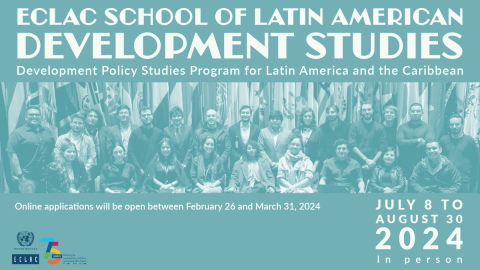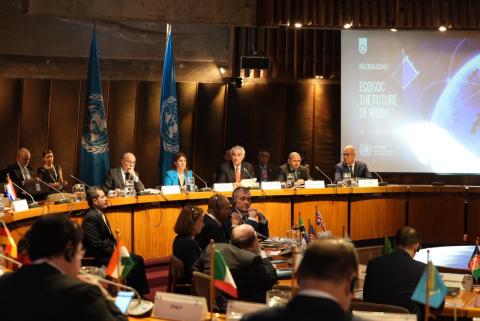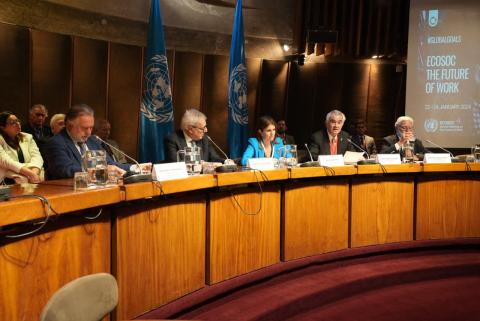Announcement
The actions fostered by the United Nations regional commissions are essential to guaranteeing the implementation of the Sustainable Development Goals (SDGs), because they help contextualize them and translate them into national realities; they also contribute to the development and implementation of joint strategies, affirmed Alicia Bárcena, Executive Secretary of the Economic Commission for Latin America and the Caribbean (ECLAC), during the High-Level Political Forum on Sustainable Development being held through July 18 in New York.
In the framework of the session on Implementing the SDGs: lessons from the Regions, ECLAC’s senior representative underscored that the UN’s five regional commissions fulfill the function of convening multi-actor dialogue, carrying out data-based analyses, delivering recommendations and promoting technical cooperation and capacity-building around the 2030 Agenda.
In the meeting moderated by Alicia Bárcena, coordinator of the UN’s five regional commissions, participants included Vera Songwe, Executive Secretary of the Economic Commission for Africa (ECA); Mohamed Ali Alhakim, Executive Secretary of the Economic and Social Commission for West Asia (ESCWA); Olga Algayerova, Executive Secretary of the Economic Commission for Europe (ECE), and Kaveh Zahedi, Deputy Executive Secretary of the Economic and Social Commission for Asia and the Pacific (ESCAP.
During her presentation, Bárcena underscored that the regional commissions have a solid track-record in their support for States Members’ plans and development agendas, and possess the tools to support their monitoring efforts and identify where there are gaps and their areas of action.
She added that, since the adoption of the global agenda in 2015, the regional commissions have provided their respective States Member with debate platforms focused on the SDGs, peer-learning and capacity-building through the Regional Forums for Sustainable Development.
The United Nations high official specified that these forums provide ideal spaces for in-depth discussion of the SDGs, their indicators and interconnections. They are also spaces for mediating the right conversations between governments and stakeholders, creating alliances and identifying opportunities for collective action.
In this sense, she emphasized the second meeting of the Forum of the Countries of Latin America and the Caribbean on Sustainable Development, held in April 2018 at ECLAC’s headquarters in Santiago, Chile, which drew nearly 1000 attendees and included 38 parallel events.
Alicia Bárcena asserted that the region takes the implementation of the SDGs very seriously. Proof of this is that, by the end of 2018, 19 of the 33 Latin American and Caribbean countries will have presented their voluntary national reviews to the High-Level Political Forum on Sustainable Development. Moreover, 20 of the 33 countries of Latin America and the Caribbean now have national coordination mechanisms for the implementation and monitoring of the 2030 Agenda.
She added that, along with defining the implementation and monitoring mechanisms, the countries of the region have begun to link their planning systems to the SDGs: of the 33 countries of the region, 27 have medium- and long-term plans; 14 have a regional framework that mandates building a development plan and 30 have citizen consultations incorporated into the creation of their plans.
In this sense, she underlined the importance of the Regional Observatory on Planning for Development, a tool coordinated by ECLAC’s Latin American and Caribbean Institute of Economic and Social Planning (ILPES), which supports the countries in the strengthening of their planning and public management processes, as well as the alignment of said processes with the 2030 Agenda and their own national and sub-national realities and priorities.
“Incorporating the SDGs into national and territorial planning schemes is essential for the implementation of the 2030 Agenda, as is the integration of the SDGs in trade models and access to information,” she emphasized.
Finally, the United Nations high official stressed that “achieving the 2030 Agenda requires more than the sum of national actions; it needs collective efforts to address regional and world issues.”
“Although realities vary from one region to the next, there is a mutual need to improve regional action to guarantee the accomplishment of goals and the necessary changes for building resilient and inclusive societies,” she stated, calling for stronger inter-regional cooperation.



